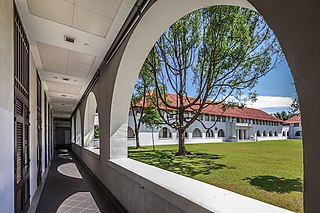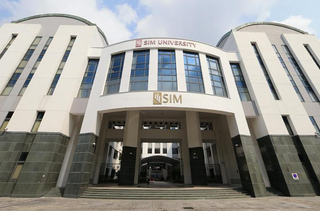Related Research Articles

A Juris Doctor, Doctor of Jurisprudence, or Doctor of Law (JD) is a graduate-entry professional degree that primarily prepares individuals to practice law. In the United States, it is the only qualifying law degree. Other jurisdictions, such as Australia, Canada, and Hong Kong, offer both the postgraduate JD degree as well as the undergraduate LL.B., BCL, or other qualifying law degree depending on the requirements of the jurisdiction where the person will practice law.

Legal education is the education of individuals in the principles, practices, and theory of law. It may be undertaken for several reasons, including to provide the knowledge and skills necessary for admission to legal practice in a particular jurisdiction, to provide a greater breadth of knowledge to those working in other professions such as politics or business, to provide current lawyers with advanced training or greater specialisation, or to update lawyers on recent developments in the law.
A Bachelor of Laws is an undergraduate law degree offered in most common law countries as the primary law degree and serves as the first professional qualification for legal practitioners. This degree requires the study of core legal subjects and jurisprudence to provide a comprehensive understanding of the legal system and its function. The LLB curriculum is designed to impart a thorough knowledge of legal principles, legal research skills, and a sound understanding of the roles and responsibilities of lawyers within society. This degree is often a prerequisite for taking bar exams or qualifying as a practising lawyer, depending on the jurisdiction. Additionally, the LLB program also serves as a foundation for further legal education, such as a Master of Laws (LLM) or other postgraduate studies in law.
A bar examination is an examination administered by the bar association of a jurisdiction that a lawyer must pass in order to be admitted to the bar of that jurisdiction.

The Singapore Management University (SMU) is a publicly-funded private university in Singapore. Founded in 2000, SMU is the third oldest autonomous university in the country, modelling its education after the Wharton School. The university is triple accredited by AACSB, EQUIS and AMBA. In 2024, SMU was ranked 44th in the world for Business and Management Studies, while also placing in the top 100 for Economics and Finance by QS.

Temasek Junior College (TJC) is a government-run junior college temporarily located in Tampines. Its original location in Bedok South is currently undergoing reconstruction as part of the JC Rejuvenation Programme. It offers a six-year Integrated Programme alongside a two-year Singapore-Cambridge GCE Advanced Level curriculum.
The National Admissions Test for Law, or LNAT, is an admissions aptitude test that was adopted in 2004 by eight UK university law programmes as an admissions requirement for home applicants. The test was established at the leading urgency of Oxford University as an answer to the problem facing universities trying to select from an increasingly competitive pool with similarly high A-levels. With effect from its second year, the LNAT is required for UK and overseas applicants alike. There are now nine participating law schools and hundreds of test centres worldwide.
The Postgraduate Certificate in Laws is an intensive one-year, full-time professional legal qualification programme in Hong Kong. It allows graduates to proceed to legal training in order to qualify to practice as either a barrister or a solicitor in Hong Kong. The "LL." of the abbreviation for the certificate is from the genitive plural legum. The programme is similar to the Legal Practice Course or the Bar Professional Training Course in England and Wales, or the Certificate in Legal Practice (Malaysia) in Malaysia which focuses heavily on practical and procedural issues in legal practice, unlike a first degree in law.
The Singapore Institute of Management (SIM) is a private tertiary education institution in Singapore. Founded on 28 November 1964 by the Economic Development Board (EDB), SIM is registered under the Committee for Private Education (CPE). SIM offers diploma, transnational undergraduate and postgraduate programmes, and executive education courses.

The Singapore University of Social Sciences (SUSS) is a public autonomous university in Singapore. Established in 2017, SUSS focuses on applied degree programmes primarily in the social sciences. In 2017, SUSS received its inaugural class of 2,137 graduates.

A law school is an institution, professional school, or department of a college or university specializing in legal education, usually involved as part of a process for becoming a judge, lawyer, or other legal professional within a given jurisdiction. Depending on the country, legal system, or desired qualifications, the coursework is undertaken at undergraduate, graduate, or both levels.

The National University of Singapore Faculty of Law is Singapore's oldest law school. NUS Law was initially established in 1956 as the Department of Law in the University of Malaya, and subsequently, University of Singapore. After its establishment, NUS Law was Singapore's only law school for half a century, until the subsequent establishment of the SMU School of Law in 2007 and the SUSS School of Law in 2017. NUS Law is currently located at the NUS Bukit Timah Campus. The current dean of NUS Law is Andrew Simester. Internationally, NUS Law has been ranked twelfth by the QS World University Rankings by Subject in 2024 and eleventh by the Times Higher Education World University Rankings by Subject in 2024.

Indranee Thurai Rajah is a Singaporean politician and lawyer who has been serving as Minister in the Prime Minister's Office and Second Minister for Finance since 2018, Second Minister for National Development and Leader of the House since 2020. A member of the governing People's Action Party (PAP), she has been the Member of Parliament (MP) representing the Tanjong Pagar–Tiong Bahru division of Tanjong Pagar GRC since 2015.

CHIJ Saint Theresa's Convent is a government-aided Catholic girls' secondary school in Bukit Merah, Singapore. The school is one of 11 Convent of the Holy Infant Jesus (CHIJ) schools in Singapore.
Junior colleges (JC) are pre-university institutions in Singapore that offer two-year pre-university courses that leads to either the Singapore-Cambridge GCE Advanced Level (A-Level) or the International Baccalaureate Diploma. Admission to junior college is based on attaining an aggregate raw score of 20 points or less in the O-Level examination.

A Doctor of Law is a doctorate in legal studies.

The Yong Pung How School of Law is one of the six schools of the Singapore Management University. It was set up as Singapore's second law school in 2007, 50 years after the NUS Faculty of Law and 10 years before SUSS School of Law. Prior to its establishment as a law school, the school was a department within the School of Business between 2000 and 2007. The school was known as the SMU School of Law until 2021, when it was renamed after former Chief Justice Yong Pung How.

SIM University (UniSIM) was a private university in Singapore that opened in 2005 before shutting down in 2017. The university was established and managed under the Singapore Institute of Management (SIM) Group. It was the only private university in Singapore after Nanyang University. The university practiced an open-door academic policy towards working adults and offered only part-time programmes. Between 2010 and 2017, UniSIM was registered under the Committee for Private Education (CPE).

The 14th Parliament of Singapore is the current Parliament of Singapore. It opened on 24 August 2020. The membership was set by the 2020 Singapore General Election on 10 July 2020.
Leslie Chew Kwee HoePBM is a Singaporean legal academic and law professor. He is the founding Dean of the School of Law, Singapore University of Social Sciences, Singapore's third law school. He also regularly teaches in other institutions including the Singapore Institute of Arbitrators and the NUS Faculty of Law, as well as the Lee Kwan Yew School of Public Policy. Chew is the founding President of the Asia Pacific Institute of Experts.
References
- ↑ "New school's cohort urged to focus on family, criminal law". The Straits Times. 19 January 2017. Retrieved 2018-09-03.
- ↑ "SUSS law school's pioneer batch sees 10% attrition". suss.edu.sg. 11 September 2018. Retrieved 2018-09-11.
- ↑ "Law Degree Programmes: Bachelor of Laws & Juris Doctor | SUSS". www.suss.edu.sg. Retrieved 2022-07-20.
- ↑ "Master of Taxation". suss.edu.sg. Retrieved 2018-09-03.
- ↑ "LLB & JD Law Admission: Prerequisites & Eligibility | SUSS". www.suss.edu.sg. Retrieved 2022-07-20.
- ↑ "LLB & JD Law Admission: Prerequisites & Eligibility | SUSS". www.suss.edu.sg. Retrieved 2022-07-20.
- ↑ "LLB & JD Law Admission: Prerequisites & Eligibility | SUSS". www.suss.edu.sg. Retrieved 2022-07-20.
- ↑ "Hope for new law school: Generalists, specialists" (PDF). straitstimes. Retrieved 2018-09-04.
- ↑ "UniSIM to house third law school in Singapore". straitstimes. 16 October 2013. Retrieved 2018-09-04.
- ↑ "Students from third law school not second class: Shanmugam". 2 November 2013. Retrieved 2018-09-04.
- ↑ "Steering committee for UniSIM law school unveiled" (PDF). Archived from the original (PDF) on 2017-09-12. Retrieved 2018-09-04.
- 1 2 "Singapore's third law school to accept students from Jan 2017" . Retrieved 2018-09-04.
- ↑ "No conversion course for external law degree holders". 2 April 2016. Retrieved 2018-09-04.
- ↑ "All 60 places filled in S'pore's third law school". 27 September 2016. Retrieved 2018-09-04.
- ↑ "Singapore University of Social Sciences to offer more full-time degree courses, places". The Straits Times. 9 May 2017. Retrieved 2018-09-03.
- ↑ Teng, Amelia (12 August 2019). "SUSS law school takes in more poly grads" (PDF). The Straits Times. p. 1. Retrieved 20 July 2022.
- ↑ "FAQs | SUSS". www.suss.edu.sg. Retrieved 2022-07-20.
- ↑ "Singapore Institute of Legal Education - Singapore Approved Universities". www.sile.edu.sg. Retrieved 2022-07-20.